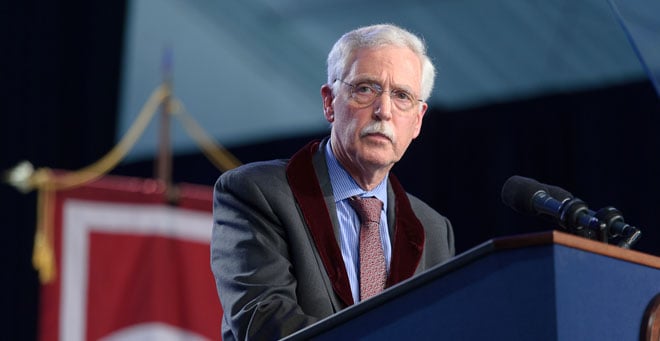 |
|
|
Robert H. Brown Jr., DPhil, MD |
A new, $2 million grant from the ALS Association to the ALS ONE-Massachusetts Partnership will support, in part, research at UMass Medical School run by internationally recognized amyotrophic lateral sclerosis (ALS) researcher Robert H. Brown Jr., DPhil, MD.
The funding will aid Dr. Brown, the Leo P. and Theresa M. LaChance Chair in Medical Research, chair and professor of neurology, and a member of the ALS ONE leadership team, and colleagues at UMMS as they develop two gene therapy strategies to silence the production of toxic RNA and proteins from the mutant gene C9orf72, the most common cause of inherited ALS. In one program, scientists will study the use of a viral vector to deliver an RNA to reduce expression of the gene. In the other, CRISPR/Cas9 gene editing will be studied to digest the offending gene enzymatically.
The ALS ONE-Massachusetts Partnership was launched earlier this year between four institutional leaders in ALS treatment development: UMass Medical School, Massachusetts General Hospital, ALS Therapy Development Institute and Compassionate Care ALS. The new funding is in addition to $2 million from ALS Funding a Cure and $2 million from ALS ONE itself to support projects to help find treatments and a cure for ALS.
“The collaboration among these distinguished centers of ALS research will help accelerate the development of meaningful new approaches to treatment,” said Lucie Bruijn, PhD, MBA, chief scientist for the ALS Association and a member of the ALS ONE board. “We are gratified to be able to help these partnerships bring their expertise to bear on this important goal, and are excited by the potential they represent.”
ALS is a progressive neurodegenerative disease that affects nerve cells in the brain and the spinal cord. Eventually, people with ALS lose the ability to initiate and control muscle movement, which leads to total paralysis and death, usually within two to five years of diagnosis. For unknown reasons, veterans are twice as likely to develop ALS as the general population. There is no cure, and only one drug approved by the U.S. Food and Drug Administration, which modestly extends survival.
Kevin Gosnell, who died in August from complications of ALS, founded ALS ONE in January to expedite progress toward finding a treatment for ALS by 2020 while improving care immediately. His vision continues with these new funding commitments. The ALS ONE partnership has already placed resources, expertise and dedicated teams into a powerful coordinated team with aligned goals and the ability to move ideas and products quickly from inception to trial and from idea into care practice.
Nazem Atassi, MD; James Berry, MD; and Merit Cudkowicz, MD, will build a regional ALS clinical trials network for rapidly and efficiently bringing the most promising new therapeutic ideas to trials in people with ALS. They will also build a translational pipeline that includes the development of new lab tests and imaging tools for testing treatment efficacy and initiate clinical trials of new potential treatments that target inflammation in ALS.
Finally, the group will expand its efforts to move clinical care beyond the walls of the clinic to improve patient access to multidisciplinary ALS care at home and access to research studies, in order to provide improved care and resources for all ALS patients. Compassionate Care ALS will work with ALS ONE partners and other providers to ensure coordinated communication between all ALS care professionals and ALS clinics so up-to-date technology, timely research information and nursing resources are available to ALS patients.
Under the leadership of Steven Perrin, PhD, Massachusetts General Hospital ALS Therapy Development Institute will spearhead integration of preclinical testing of promising therapeutics with the regional clinical trials network. Rigorous development of preclinical data, including mechanistic, pharmacodynamics and pharmacokinetic data, is essential for improving the chances of success once a drug reaches clinical testing.
Related stories on UMassMedNow:
Robert H. Brown Jr. tells Boston Globe why he’s committed to an ALS cure
New ALS ONE license plate to support ALS research and care
UMMS-led discovery of ALS gene funded by Ice Bucket Challenge; nets global attention